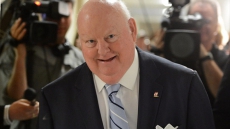TORONTO — A parent-led campaign to keep children home from class in protest of Ontario's new sexual-education curriculum gained early traction on Monday as at least one school reported that nearly all of its students were absent.
Ryan Bird, a spokesman with the Toronto District School Board, reported that at least one of the city's elementary schools had an absentee rate of more than 90 per cent on the first day of the campaign, which was largely organized through Facebook.
Bird said Thorncliffe Park Public School was reporting that 1,220 of its 1,350 students were not in class, adding that about 100 parents had turned up to stage a protest outside the building.
Thorncliffe Park, which serves students from Grades 1 to 5 in midtown Toronto, is widely recognized as having a large Muslim population.
Many of the objections to the updated curriculum have been mounted on religious grounds. Opponents have argued that the new program, which will teach students about concepts including gender identity, sexual orientation and masturbation, does not align with their values and is not appropriate for school-age children.
Curriculum supporters, however, contend the updated guidelines have brought Ontario in line with the rest of the provinces in Canada as well as several jurisdictions in the United States.
Alex McKay, Executive Director of the Sex Information and Education Council of Canada, says the only aspects of the curriculum that are not addressed in other provinces are conversations around consent and the dangers of sharing sexually explicit images electronically.
McKay says the curriculum is entirely age appropriate.
"For sexual health education to be effective, young people need to be armed with this information as they approach ages where a significant proportion of them will begin to become sexually active," McKay said. "Providing basic information...as kids are approaching puberty is developmentally appropriate."
Opposition efforts grew more vocal in recent weeks with the advent of a Facebook group called "Parents & Students on strike: one week no school." The group encouraged parents who oppose the curriculum to keep their kids at home in protest, even offering a letter template to explain their children's absence.
The Toronto District School Board did not yet have estimates of how many children were kept out of class across the city, but did state that their absences would be treated just like any other and students were responsible for catching up to any missed classwork.
At least one school board was expecting a spike in absences during the early days of the Facebook campaign.

Janet McDougald, chair of the Peel District School Board, said she thinks a "fair number" of parents will pull their kids from school for at least the first day of the week in the culturally diverse region just west of Toronto.
McDougald said opposition to the new curriculum has been largely founded on misinformation, adding that just because something is touched upon in curriculum guidelines does not mean it will necessarily be discussed in class.
"There are people, for their own purposes that I can't predict what they are, but they have spread outrageous material in the community," she said. "Totally outrageous material, that in fact we're going to demonstrate how to masturbate, that children are going to have to show their private parts. I mean, that's just ridiculous."
Under the new curriculum, Grade 3 students will learn about same-sex relationships, kids in Grades 4 and up will learn more about the dangers of online bullying, while the perils of sexting will come in Grade 7.
Lessons about puberty will move from Grade 5 to Grade 4, while masturbation and "gender expression" are mentioned in the Grade 6 curriculum. Anal sex is part of the Grade 7 curriculum, in the context of choosing to abstain from or delay certain activities in order to avoid sexually transmitted infections.
Ontario parents also have the right to withdraw their children from aspects of the curriculum that they find objectionable.
Sex education has long been a hot-button issue in the United States, where some conservative jurisdictions have brought in abstinence-only sex-ed instruction, while others have programs similar or even more progressive than Ontario's. And even in the U.K. and countries like progressive Iceland, with curricula similar to Ontario's and other Canadian provinces, there is some opposition to evolving sex-education programs.
That's despite the fact that numerous Canadian and international studies have shown that fulsome sex-education programs have played a part in teens waiting longer to have sex, in increased contraceptive use and in reduced teen pregnancy rates.
A comprehensive 2011 U.S. study by Wellesley College also showed that programs like Ontario's are simply addressing questions that kids are already asking in a digital world where the information is at their fingertips.
FIVE THINGS TO KNOW ABOUT ONTARIO'S CONTROVERSIAL NEW SEX-ED CURRICULUM

TORONTO — The Ontario government has updated the province's sexual-education curriculum, a move that's been applauded by some and opposed by others. Here are five things to know about the new program:
What does the new curriculum look like?
It will teach students in Grade 1 the proper names for body parts. Grade 2 students will learn about the broad concept of consent by being told that no means no. Concepts of gender identity will be introduced in Grade 3. Discussions about puberty move to Grade 4 from Grade 5, while education about intercourse will take place the following year. Masturbation and "gender expression'' will be mentioned in Grade 6, while kids in Grades 7 and 8 will discuss contraception, anal and oral sex, preventing pregnancy and sexually transmitted infections. Students will also learn about online bullying and the dangers of sharing sexually explicit images electronically.
Who opposes the curriculum and why?
Some of the objections come from religious groups who claim the curriculum doesn't align with their values. Some parents have also accused the government of failing to allow them enough input into the development of the new curriculum. Criticism around the gender identity portion of the program has been particularly contentious in light of the fact that Premier Kathleen Wynne is openly gay. Wynne called some of the criticism "homophobic."

What do the other provinces do?
Ontario hadn't previously updated the curriculum since 1998 and argues that the changes are necessary to bring sexual education in line with other provinces. By teaching concepts around sexual orientation and gender identity at an early age, it joins the ranks of Quebec, Saskatchewan and Nova Scotia. At least four other provinces choose to tackle the issue in Grade 6 or beyond. Concepts like consent, contraception, prevention of sexually transmitted infections and online safety appear on nearly every provincial curriculum. Some provinces begin teaching these concepts as early as kindergarten.
When does it kick in?
Education Minister Liz Sandals has said that the new curriculum will go into effect this September.
Is it mandatory for all students?
No. Parents have the right to withdraw their kids from all or part of the new curriculum if they're uncomfortable with its content.





